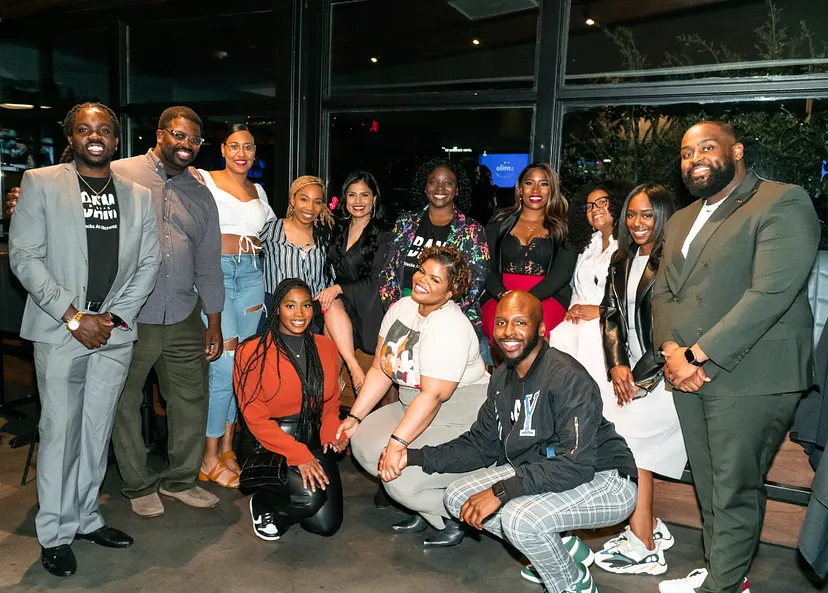
Image via Tribaja
When Shannon Morales was a little girl, she wanted to be an entrepreneur. Her first idea was for a spray-on lip gloss.
“It does not make sense at all. But to me, it was just a way to express my creativity,” said Morales. In her adult years, she founded Tribaja, an AI-powered platform that customizes work experiences for the working class.
“I just remember having these vivid dreams of being one of those women who had very luxurious business suits, a briefcase, and coming out of a large corporate office. In my mind, I wasn’t sure if that meant that I would be a businesswoman or the president. But I think I realized that I wanted to own my own company.”
Later, as a single mother attending college, Morales never lost sight of her ambition. But she was looking for career opportunities that allowed her to provide for her family and lead her into a path that would one day allow her to be a business owner.
“I was a mom going to school. I researched opportunities that were making the most money. What popped up at the top was having a role in finance. I got my business degree and worked in finance for about five years.”
Though she wasn’t passionate about the role, Morales was good at her job. The position enabled her to get a feel for business and transition into a corporate innovation role. Intending to own her own company before 30 years of age, she started her first staffing agency in 2017.
Read this week’s Founder Feature to discover how Morales made her ambition work for her and other people of color who embark on making their career goals come true.

Image via Tribaja
digitalundivided: What kind of obstacles did you face personally or professionally, either before or while you were starting your business?
Shannon Morales: The same thing that most entrepreneurs face; the fear of the ambiguity of starting a business. You don’t know what you don’t know. In entrepreneurship, you learn by fire. There aren’t enough classes to prepare you for the goals you will face when starting your own business. Things happen. Market shifts happen, and it changes the way people may interact with your company. There might be hiring slowdowns, which also affect your profits and revenue. You have to be constantly ready to pivot and shift along with the changing times in the market. Those were some of the things that I think I had to learn by doing.
Professionals must also understand there will never be a right time to start a business. You have to go out there and start something, even if it’s something small, and then you can always build upon it year after year. It took me six years to build the business that I have right now. It wasn’t overnight. It looks fancy and shiny when you see it on social media. But it took time, pivots, adjusting to the market, and understanding our users.
digitalundivided: That’s a great pivot into our next question. Why is Tribaja necessary for this market?
Shannon Morales: When we first started, we focused very broadly on under-supportive professionals, predominantly Black and Latinx folks. But now we have a stronger focus on working-class professionals. Those might be professionals that are underpaid or unemployed, who might be working in jobs displaced by automation and AI.
Right now is an excellent time for our company because our business is the solution for this particular demographic and audience. AI is coming in. It’s definitely changing the way that people work. If our community isn’t upskilled and unaware of those changes, they will be left behind. Specific working-class women are also the most effective because 60% of the tech layoffs were women, and 50% of the pandemic layoffs were women. There really hasn’t been enough time between the pandemic and layoffs to allow that group of professionals to return to where they were pre-pandemic. It’s almost like this snowball effect of what will happen every time there’s an economic downturn. It is always going to be marginalized groups, women, and working-class professionals that are on the front lines that are going to be the most impacted. If that’s the case, we need to create a solution that’s helping them and not just focusing on a broad segment of professionals. We need to narrow it down to who is most impacted and how we can create solutions to help them.

digitalundivided: How did participating in digitalundivided’s Breakthrough program help you navigate your founder journey?
Shannon Morales: There are a lot of pieces that go into an underdeveloped business. There were portions of Tribaja, that, because I’m a solo founder and pretty much touch all areas of operation for the business, I wasn’t really looking at. How can we improve our marketing analytics? How can we understand our users better? We learned those things during the digitalundivided Breakthrough program. I felt very enlightened and grateful to have been a part of it because those topics weren’t discussed. Other programs might focus on raising capital or building technology into your platform. But they don’t talk about how to understand your users. Or how to understand Google Analytics? There were just so many great gems and tips that we took from the program.
In addition, I was connected to some amazing local founders we didn’t know existed and built a network of professionals where you can always reach out and say, “Hey, you know, I’m struggling a little bit. Is there a way that we can get together for coffee and we can help each other?” I think it is an invaluable experience to have that community and network of like-minded women who are also building amazing businesses.
digitalundivided: What is one business motto you always abide by?
Shannon Morales: A lot of folks talk about market saturation, especially in future work. Last year, companies were throwing lots of money at Diversity and Inclusion in recruiting/ A lot of companies came out of nowhere and started building these very similar platforms to Tribaja. But my thought process was always the same. No founder’s going to build the company the way that I would build the company. So my motto is to continue to do. Just continue to strive for what you believe is going to be a differentiator in the market that you’re in. Because nobody can build the business the way that you’re going to build a business, even if you potentially think the market is saturated.
A lot of folks are going to fail. A lot of folks will stick. We have years in this game. For someone who’s just starting, they’re going to have to go through all those hiccups and mistakes that we went through years ago. No market right now will scare us away from doing the work we were meant to do.
digitalundivided: What kind of advice do you have for other entrepreneurs on their journey?
Shannon Morales: Be resilient. Be extremely resilient. Understand that there’s no ideal scenario when you’re building a company. Most folks think that you’re going to build a company, you’re going to get your initial users, and the company that you started with is going to be the company that’s going to, you know, help you raise millions of dollars or help you attract users and revenue. But that’s not the case. I don’t think that’s ever been the case that a company that started with one idea has actually stayed the same for years and years. You will constantly pivot to accommodate the market and what the users tell you. So your business might have started with an idea that you created. But once you get that user feedback about what they want about what they’re willing to pay for, that idea starts to change and transition into something that goes beyond your understanding of what you thought their original product was supposed to be.
Are you an Oakland-based, early-stage founder looking to better understand your customer, grow marketing strategies, and gain networking opportunities to scale your venture? Apply to digitalundivided’s BREAKTHROUGH Oakland program today! Each company accepted into the program will receive a $5,000 grant—applications close May 21st.
[Editors note]: This interview has been lightly edited from its original transcription.

